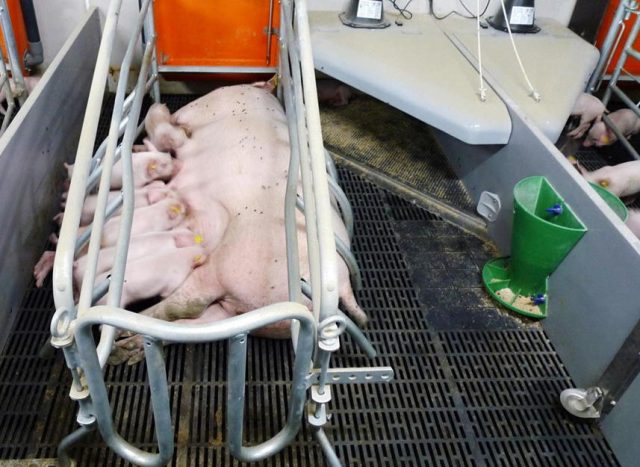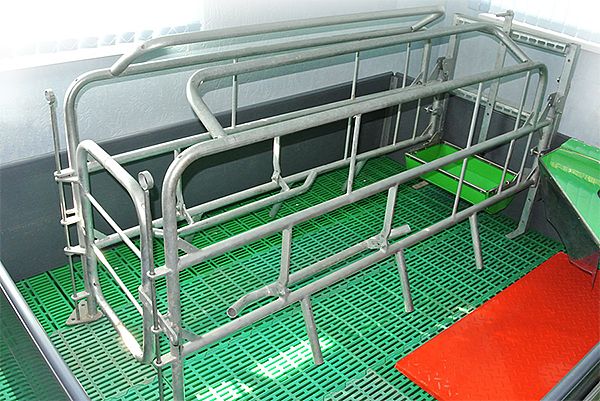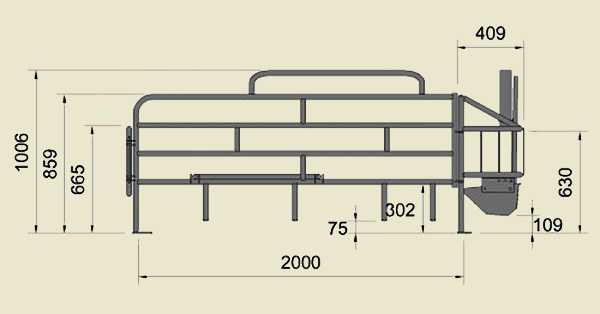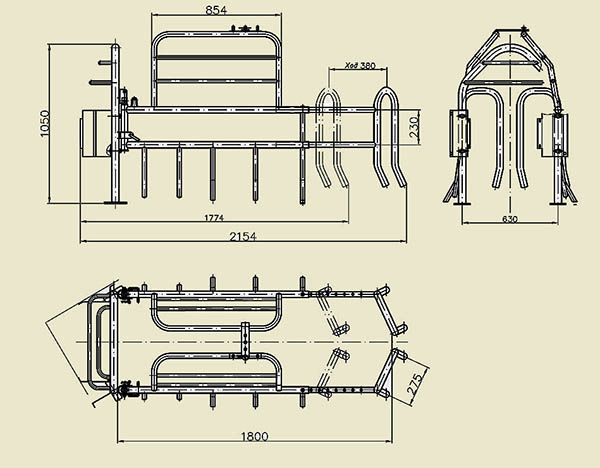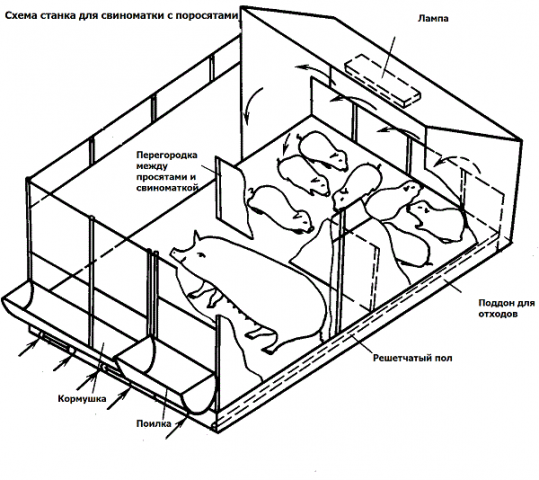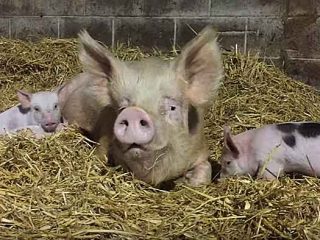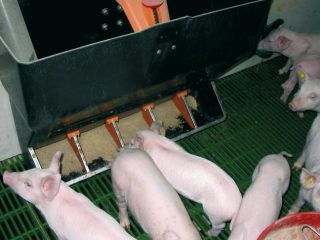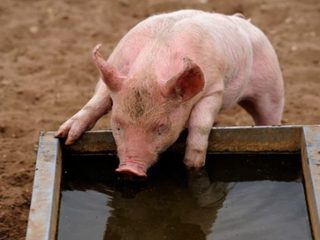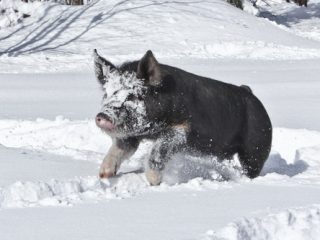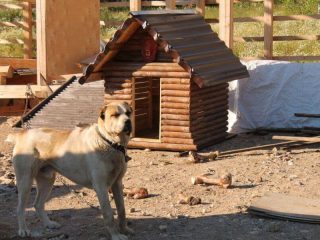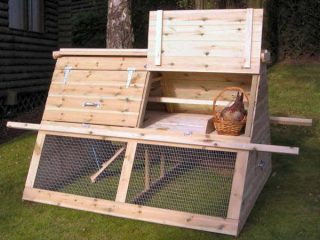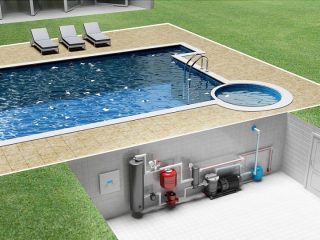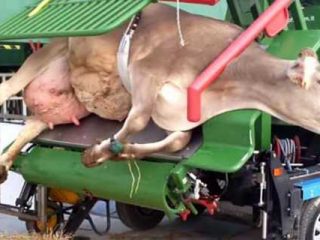Content
A do-it-yourself drawing of a sow farrowing pen can be developed if you know exactly the size and structure of the structure. If you have little experience, the scheme can be found in the literature or on the Internet. The farrowing cage has a simple design. To make it, you need to have the skills of a welder.
The advantages of using the machine
Many rural pig breeders save money on the purchase or manufacture of a pens. For farrowing, sows simply equip a warm barn. The decision is wrong, since the presence of a machine allows you to get more profit in the future.
During farrowing, the sow usually produces up to 18 piglets. In good conditions, the young grows quickly, gaining weight. If all the livestock survive and grow, then the owner will make a good profit. However, at suckling age there is a risk of death of piglets. The reason may be a lack of milk, the sow's refusal to feed, the weak condition of the babies. In most cases, the pig breeder cannot influence these processes. However, there is another problem. Mechanical damage accounts for up to 14% of deaths. After farrowing, the sow lies on its side most of the time. During the day, she gets up about 15 times, go to bed, turn over on the other side for ease of feeding. During such movements, the suckers fall under the heavy side of the pig, cripple or simply choke. The assembled sow cage at home minimizes the risk of mechanical damage to the offspring.
Inexperienced owners may confuse the farrowing cage with the insemination pen. In fact, the designs are different in purpose. The insemination pen allows you to firmly fix the pig during fertilization. It is not suitable for farrowing. Likewise, pens designed for other animals will not work.
With a farrowing crate available, the owner gains many benefits:
- For the pig, the ideal conditions for safe farrowing are created.
- The number of offspring deaths is reduced.
- Feeding convenience for suckers is improved. Piglets get stronger faster, gain weight.
- Caring for the sow itself is simplified. It is easier for the owner to clean up the waste, as it is not scattered throughout the pigsty. In addition, less bedding is required to cover a small area.
- The insemination crate cannot be used for farrowing, but in reverse order. If necessary, the pig is clamped in the farrowing structure during artificial insemination.
Having weighed all the advantages and future profit, it is more profitable for the pig breeder to incur the initial costs of manufacturing the machine.
Requirements for pens for gestating sows
On pig farms, pregnant sows are kept in group pens for about 6-10 heads. The constructions are made of stainless steel or ferrous metal with galvanized coating. Sometimes they are just dyed. There are stalls made of durable plastic for group keeping of sows. However, their frame itself is made of metal. Only plastic wickets and partitions.
Group structures are equipped with feeders, teat-type drinkers. For pregnant sows, they provide free and individual housing in a group pen. Separate compartments are used to secure the pig during the veterinarian examination.
Regardless of the fact that the machine is a group or single, home-made or factory-made, a number of requirements are imposed on the design.If the cage meets the standards, the work of the pig breeder will be much easier, since he will have to clean, control the litter and the sow, and feed. The machine will be examined by a veterinarian, if necessary, treatment and other actions will be carried out.
In order for a self-assembled sow machine to become a real assistant in the farm, it must meet the following requirements:
- Dimensions. On sale you can see pens for farrowing of different sizes. This is not a marriage. Models are designed for different breeds. The sow's weight can vary from 100 to 300 kg. When self-made, the dimensions are calculated taking into account the contained breed. Usually, the width of the pens is made from 50 to 70 cm.The minimum length is 140 cm, but the indicator is similarly increased taking into account the length of the sow. The height of the structure is limited to 110 cm.A gap of 30 cm is maintained between the floor and the lower tube of the machine.
- Material. The strength of the homemade construction for farrowing is provided only by metal. There are several options here. It is cheaper to weld a cage from an ordinary pipe, but it will have to be cleaned and painted annually. Ferrous metal rusts quickly. Galvanized pipes are considered the best choice in terms of price and quality. The ideal material is stainless steel. The downside of such pipes is their high cost.
- Practicality. The breeds of reared pigs may change over the years. It is not profitable to make a new farrowing cage every time. It is optimal to immediately make a sliding structure with the ability to adjust the size for the sow's physique.
- Location type. The machines are installed diagonally or straight. The choice is according to the preference of the owner. However, diagonal models are more difficult to clear of manure. In addition, sow nipples are more likely to be injured in such cages.
- Floor. In order not to clear the machine from manure several times a day, the flooring is made with slots. The size of the gaps cannot be overestimated. In large crevices on the floor, the hooves of a standing pig will get stuck, the nipples of the sow during feeding, when the female lies on her side.
A purchased or self-made pen is placed in the farrowing box. The compartment should be spacious. In addition to the area for the cage, the box provides for a space where the kids will run. It is optimal to prepare a box with an area of 4.5 m for the machine2.
How to make a pig farrowing cage
To make a cage, you will need a blueprint, metal and welding skills. The process will go faster if there is an opportunity to see the device of the finished machine in reality.
Tools and materials
When assembling a sow farrowing crate with your own hands, you will need to stock up on materials:
- pipe with a diameter of 25-40 mm;
- knees of a similar section;
- wicket hinges;
- welding electrodes;
- cutting wheels on the grinder.
From the tool you can not do without a welding machine and a grinder. Additionally, you need a hammer, pliers.
Drawings, dimensions
It is easier to assemble a cage according to ready-made drawings. Sizes can be maintained as long as they fit the sow's body. Otherwise, the animal is measured. Be sure to make a small supply, because over time the sow is able to recover.
Build process
When all the tools and materials are prepared, the dimensions are determined, there is a drawing at hand, they begin to assemble the farrowing cage:
- Adhering to the dimensions of the drawing, the workpieces are cut from the pipes with a grinder. Each element is numbered so as not to be confused.
- The prepared blanks are welded into a single structure. Where turns are required, elbows are welded to the pipes.
- A feeder is attached in front of the cage at a height of 50 cm from the floor.
- An opening for the wicket is left in the fenced structure. The door is attached with hinges so that it opens outward and inward. Necessarily provide for the heck.
- The cage structure consists of arcs and lattices. Additionally, dampers are made. The elements allow you to fix the sow in a supine position or standing, which reduces the risk of crushing the suckers.
All structural elements must be securely fastened. The requirement also applies to feeders and drinkers.
The video shows a sample machine:
Installation of the structure
At the time of manufacturing the cage, a box must be prepared where it will be located. The room is insulated, eliminates the likelihood of drafts, equips natural ventilation. The air ducts are equipped with control dampers.
The cage can be made mobile or stationary. If the second option is chosen, the structure is immediately welded to the concreted racks. Fixation is carried out with corners. A gap is left under the floor to allow the slide-out tray to be inserted.
In the room, the machine is positioned so that there is a free approach for the suckers on both sides. Drinking bowls with a feeder are attached on one side of the cage, and a red lamp is securely fixed on the opposite wall in a protective net. It will serve as a source of light and heating.
Terms of use
To make the sow and suckers comfortable, maintain a temperature regime in the range of 32-37 aboutC. If the box is well insulated, a 150 W lamp will provide the required temperature in the area of the cage. Control is carried out with an ordinary thermometer.
The floor of the sow is laid soft. Be sure to monitor the availability of food and water. If the drinker is empty during farrowing, the pig is able to eat the litter. Ventilation is regulated with dampers until high-quality air exchange is obtained.
Conclusion
It is more convenient to develop a drawing of a sow farrowing pen with your own hands because of taking into account all the nuances. The owner adjusts the design to suit his needs, takes into account the peculiarities of the location in the box.
